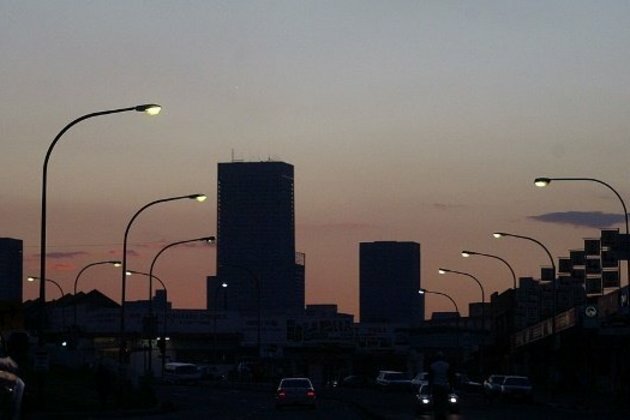Here's how much a downgrade to junk will cost South Africa
News24
31 Mar 2020, 11:43 GMT+10

What's the cost of becoming junk? South Africa will soon find out.
The country lost its last investment-grade rating late on Friday when Moody's Investors Service cut it to Ba1, citing a weak economy and an unreliable power sector.
When markets re-opened on Monday in Asia, the effect was immediate. The rand fell to a record low, weakening beyond 18 per dollar for the first time, before paring losses. The government's local-currency debt and Eurobonds, as well as banking stocks, also dropped. The rand weakened 0.1% to 17.93 against the dollar as of 06:45 in Johannesburg on Tuesday, extending its decline this year to 22%.
There could be more to come. The downgrade will trigger South Africa's exclusion, probably around late April, from the FTSE World Government Bond Index. The gauge includes 14 currencies, including the dollar, yen and euro, and is tracked by around $3 trillion of funds.
Passive funds following the WGBI will have to dump rand bonds once they're excluded. South Africa has a 0.45% weighting in the main index, suggesting there could be roughly $14 billion of passive money holding rand government bonds. But it's impossible to tell accurately since funds can be under- or overweight South Africa, which is the highest-yielding member of the WGBI.
Here's what analysts say the impact could be on the rand and in terms of outflows from South Africa:
Barclays
The Moody's downgrade may lead to $6 billion of forced bond selling, London-based analysts Michael Kafe, Nikolaos Sgouropoulos and Andreas Kolbe said. If so, that would cause foreign holdings of the government's rand debt to fall to about 30%-32% of the total from 37%. Another downgrade is possible, they said, if South Africa doesn't quickly reduce a budget deficit that was expected to rise to a three-decade high in the next year even before the coronavirus struck.
Citigroup
The Wall Street bank had previously estimated that South Africa would experience $6.6 billion of outflows on a Moody's downgrade. "However, the event has been expected and thus priced in for a long time and, with markets also selling off significantly this month, the actual outflow is likely to be far smaller than the original estimate," Gina Schoeman, a Johannesburg-based economist at the bank, said on Monday.
Deutsche Bank
Deutsche had been advising clients to wait for a downgrade and then buy rand debt as yields rose. The coronavirus pandemic has changed that and it now thinks the rand could depreciate another 10% to 20 per dollar. "We find risk-reward as not attractive enough to get bullish immediately post the downgrade, considering the domestic challenges and the external backdrop," said Christian Wietoska, a strategist in London.
Intellidex
Around $3 billion of passive outflows will occur directly because of the rating cut, according to Peter Attard Montalto, London-based head of capital-markets research at Intellidex. Another $2 billion will probably exit the country once the WGBI exclusion happens, he said. He believes S&P Global Ratings and Fitch Ratings Ltd. may lower South Africa's rating in the coming months and that Moody's will do so again in the next year.
Morgan Stanley
The US lender is in the more optimistic camp, predicting $2 billion to $4 billion of capital will exit South Africa. The rand will still weaken, according to analysts including Andrea Masia, who's based in Johannesburg. That will be driven in part by the central bank's decision last week to buy government bonds in the secondary market for the first time. The effect of the operation will be "to print money and expand the money supply," they said.
Standard Chartered
Outflows could total anywhere between $4 billion and $10 billion, according to Geoff Kendrick, London-based head of emerging-market currency research at Standard Chartered. But further rand losses will be limited, he said, recommending that clients sell the dollar if the exchange rate gets to 19. That's because by the end of last month, funds had already hedged their rand exposure to the greatest degree since 2015, according to the bank's calculations. Moreover, the fall in rand bonds in March - their average yield is now 11.2%, according to Bloomberg Barclays indexes - is starting to make them attractive, he said.
 Share
Share
 Tweet
Tweet
 Share
Share
 Flip
Flip
 Email
Email
Watch latest videos
Subscribe and Follow
Get a daily dose of Kansas City Post news through our daily email, its complimentary and keeps you fully up to date with world and business news as well.
News RELEASES
Publish news of your business, community or sports group, personnel appointments, major event and more by submitting a news release to Kansas City Post.
More InformationInternational
SectionCDC: US records 1,288 measles cases, most since 1992 outbreak
ATLANTA, Georgia: The United States is facing its worst measles outbreak in more than three decades, with 1,288 confirmed cases so...
Gaza War sucking life out of an Israeli generation
In the past month alone, 23 Israeli soldiers have been killed in Gaza—three more than the number of remaining living hostages held...
Faulty IT system at heart of UK Post Office scandal, says report
LONDON, U.K.: At least 13 people are believed to have taken their own lives as a result of the U.K.'s Post Office scandal, in which...
Travelers can now keep shoes on at TSA checkpoints
WASHINGTON, D.C.: Travelers at U.S. airports will no longer need to remove their shoes during security screenings, Department of Homeland...
Rubio impersonator used AI to reach officials via Signal: cable
WASHINGTON, D.C.: An elaborate impersonation scheme involving artificial intelligence targeted senior U.S. and foreign officials in...
Warsaw responds to migration pressure with new border controls
SLUBICE, Poland: Poland reinstated border controls with Germany and Lithuania on July 7, following Germany's earlier reintroduction...
Business
SectionAI saves $500 million for Microsoft as layoffs reshape strategy
REDMOND, Washington: Artificial intelligence is transforming Microsoft's bottom line. The company saved over US$500 million last year...
FTC’s rule to ease subscription cancellations struck down by court
WASHINGTON, D.C.: A federal rule designed to make it easier for Americans to cancel subscriptions has been blocked by a U.S. appeals...
Musk’s X loses CEO Linda Yaccarino amid AI backlash, ad woes
BASTROP, Texas: In a surprising turn at Elon Musk's X platform, CEO Linda Yaccarino announced she is stepping down, just months after...
Ex-UK PM Sunak takes advisory role at Goldman Sachs
NEW YORK CITY, New York: Former British prime minister Rishi Sunak will return to Goldman Sachs in an advisory role, the Wall Street...
Gold ETF inflows hit 5-year high as tariffs drive safe-haven bets
LONDON, U.K.: Physically backed gold exchange-traded funds recorded their most significant semi-annual inflow since the first half...
PwC: Copper shortages may disrupt 32 percent of chip output by 2035
AMSTERDAM, Netherlands: Some 32 percent of global semiconductor production could face climate change-related copper supply disruptions...













